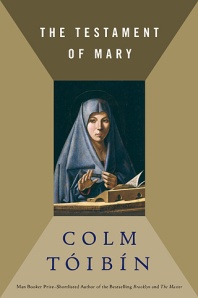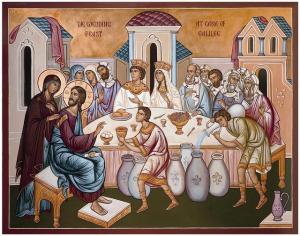“The Testament of Mary” by Colm Toibin (2012) – 81 pages
“The Testament of Mary” is NOT a celebratory Christmas story, far from it. The novella’s subject is not Jesus’ birth but rather his death. It contains a graphic eyewitness account by Jesus’ mother Mary of his crucifixion and death. She watches as they drive the nails into her son’s wrists to bind him to the cross, and as he screams out in pain.
The novel begins a few weeks before the crucifixion. Jesus has a devoted group of followers. Mary is always worried that Jesus’ followers will ultimately get him into trouble. Mary describes these followers.
“He gathered around him, I said, a group of misfits, who were only children like himself, or men without followers, or men who could not look a woman in the eye. Men who were seen smiling to themselves, or had grown old while they were still young. Not one of them was normal, I said…”
Jesus and his mother (Joseph had already died.) travel to Cana for the wedding of her cousin Miriam’s daughter. Lazarus, the brother of their friends Martha and Mary who also live in Cana, falls ill and dies while they are there, and Jesus performs one of his major miracles raising Lazarus from the dead. The acclaim of Jesus grows, but his mother only sees that Lazarus is now much like a ghost, only half alive. In every instance Mary downplays Jesus’ accomplishments perhaps in the hope that he won’t attract the jealous attention of the government officials.
These stories were familiar to me from my early religious training, but it was interesting to see them played out from the mother Mary’s perspective.
“The Testament of Mary” is the second book by Colm Toibin I’ve read, having read “The Heather Blazing’ before. I must admit that I do have a problem with his style of writing. This problem is probably more my problem rather than his. Toibin’s style always seems to me to be austere, unadorned. stripped down, and exacting. Its simplicity and clarity are major positive attributes of this style. However I wish the style were more lively, colorful, and surprising. I suppose one could say that each of Toibin’s sentences has a simple perfection. However I prefer a more ragged style filled with more possibilities and personality.
Perhaps one could argue that “The Testament of Mary” is a novella with a deeply religious subject, and obviously you don’t want some vile cynic like Evelyn Waugh or Kingsley Amis telling the story. True, true, but I get bored with pristine perfection.


Posted by Lisa Hill on December 20, 2012 at 9:10 AM
I haven’t read your review because this is on my TBR and I hope to get to it soon, but I’ve tagged this review and will come back to it after I’ve read the book.
Cheers
Lisa
LikeLike
Posted by anokatony on December 20, 2012 at 1:23 PM
Hi Lisa,
Thanks for stopping by, and Happy Holidays!
LikeLike
Posted by Lisa Hill on December 21, 2012 at 11:18 AM
Yes, you too!
LikeLike
Posted by KevinfromCanada on December 20, 2012 at 4:15 PM
Tony: I appreciate your point about the austere nature of Toibin’s style, but I think that is more a characteristic of his shorter works — the longer novels have a literary richness to them. I have both Brooklyn and The Master on standby for re-reading — I was most impressed with both on the first read.
LikeLike
Posted by anokatony on December 20, 2012 at 6:15 PM
Hi KFC,
Interesting, I’ve never thought of Toibin as anything but austere. I’ve avoided “The Master’, because Henry James is not exactly one of my idols. I’ve had my difficulties with him also. Maybe I should try “Brooklyn” which might give me a different perspective on Toibin.
Thanks for providing a different outlook on Colm Toibin, and Happy Holidays!
LikeLike
Posted by Kat on December 22, 2012 at 4:33 AM
Tony, I have a copy of this on my e-reader. It’s short, so I can read it and get my “male book count” up. I loved Toibin’s The Master, and have meant to read something else by him. From what I’ve heard this isn’t the book, but it is the one I have.
LikeLike
Posted by anokatony on December 22, 2012 at 6:19 AM
Hi Kat,
It’s nice when these top-rank novelists give us a novella. Currently I’m going the other direction, reading the 548-page “The Yips” by Nicola Barker. However it’s mostly dialogue and goes fast.
LikeLike
Posted by Kat on December 23, 2012 at 4:19 AM
I love Nicola Barker. I had forgotten about this: Booker-nominated? I’ll have to look for it.
LikeLike
Posted by anokatony on December 23, 2012 at 5:50 AM
Yes, “Wide Open” won me over to Nicola Barker several years ago, and since then I’ve read ‘Clear’ and the 3-Button Trick and other Stories’. And now “The Yips”.
LikeLike